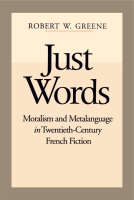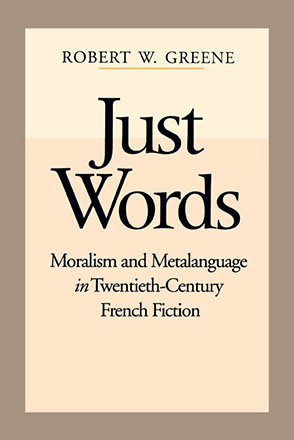Just Words
Moralism and Metalanguage in Twentieth-Century French Fiction
Robert W. Greene
Are the words that a novelist uses adequate to his or her elusive subject—the human condition? Are they pertinent, accurate, invariably fair, unflinchingly honest? Or do the novelist's words execute essentially formal maneuvers, engaging our interest through their patterns rather than their reach? And what about a possible third, synthesizing option? Robert W. Greene discovers that the two apparently divergent intentions in question (metalinguistic vs. moralistic) often paradoxically coexist in French fiction. Also, no doubt because it is more consistently self-conscious than that of any previous era, the fiction of twentieth-century France seems to illustrate this convergence with special brillance.
- Description
- Bio
- Subjects
From L'lmmoralist (1902) to L'Usage de la parole (1980) Greene explores combinations and permutations of moralistic analysis and metalinguistic commentary in a particular sequence of prose narrative. Along the way, he observes Gide, Proust, Malraux, Camus, Duras, and Sarraute, each in his or her own fashion, moving ceaselessly back and forth between soundings of the heart and diagnoses of the tongue.
Robert W. Greene is Professor of French Studies at the State University of New York, Albany, and author of The Poetic Theory of Pierre Reverdy (1967) and Six French Poets of Our Time (1979).
Mailing List
Subscribe to our mailing list and be notified about new titles, journals and catalogs.




